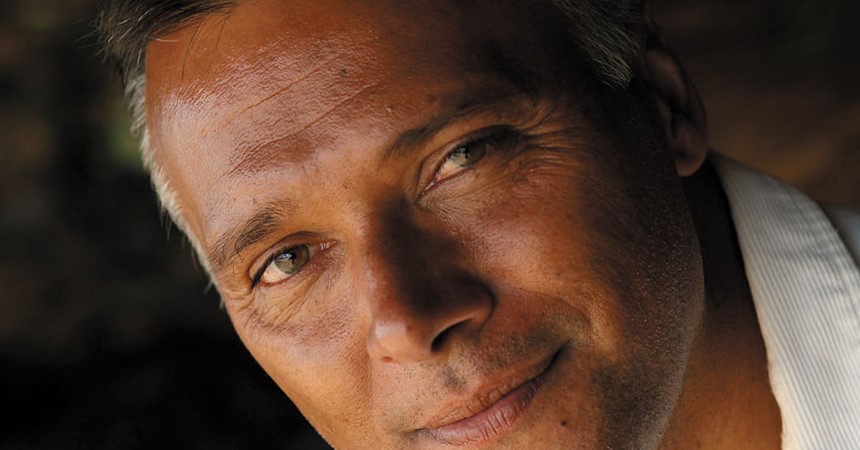My school history books carried photos of Truganini. At first she was young, proud and defiant and then older, grey, in a white woman’s clothes. It was this later image that illustrated the fate of her people; how in one lifetime – I was taught – they had faded from the landscape. Of course that too was a lie, a tragic convenient version of history where guilt could be buried with the ‘last Tasmanian’.
The Tasmanian blacks, just like us were clinging onto life, regrouping and replenishing on sparsely inhabited islands, the mixed offspring of whalers and Aboriginal women, with facial features that merged both and lighter skin, but outcast all the same and now told they were extinct.
* * *
Exclusion and difference: these were the abiding lessons of my early school years. They could be days marked with ritual humiliation. I can still hear the roll call of our names. One by one the black kids were pulled out of class. We’d be searched for head lice, our teeth examined. Our fingernails examined for signs of dirt. We were questioned about what we’d had for dinner the previous night. We would have to open our bags to show what we had for lunch.
I remember my teacher looking on and smiling as the government officers continued their interrogation. I recall grasping for answers. I did not know if I could satisfy them. These people likely thought themselves well meaning. But they scared me. My family – like any Aboriginal family – had seen children taken. It could just as easily be me. I remember after school, peering around my street corner looking for the tell-tale white cars of the welfare men, as we called them. Any sign of them and I’d hide out for hours. I would wait until dark then creep back home.
This is where I met white people. I met them in their imaginations. I was introduced in the snickering glances of my classmates, in the interrogation and implicit threat of the deceptively kind welfare officers and the complicit smiles of a kindergarten teacher who asked me to sing Cat Stevens songs for my class but was herself trapped in the prism of racism in 1960s Australia and could not see that morning had not broken for us.
I had no illusions of equality. We were another class of people. Our poverty branded on us as clearly as our colour. I wore the hand-me-down clothes of other people, pulled from cardboard boxes in second-hand bins. There were frayed, ill-fitting shirts, and jumpers stinking of mothballs with the names of other boys stencilled in the collars.
Like any childhood memories mine are sketchy. There are flashes of faces, perhaps a smell or a sound. Petula Clark’s “Downtown” is a blast of musical liberation stuck on permanent rotation in my mind with its promise of forgetting our troubles and cares. I saw the movie Born Free, entering the cinema and being transported to Africa, a lion and freedom.
And I remember pineapple juice from a Golden Circle can. I can picture the two triangles punched in the lid to release the taste of a world of possibilities. I was probably five years old, and in one sip all of my senses were jolted to life. My small hands folded around the can. I can still smell that tangy, sticky, sweetness. Then there was the taste: an explosion on my tongue like a bee sting.
I only took one sip. It was my father’s juice, his one indulgence. It was the small piece of the world he’d hold for himself, a reward for bending his back to put food on our table. My mother warned us not to touch it. But like any child that only made it more tempting. In one forbidden sip I tasted the promise of a world outside my own; a world of music and movies that shone so brightly but were ultimately counterpoints to a more grim reality. The abiding memories of my childhood remain the things that separated us.
On my seventh birthday my mother threw me a party. It was the only birthday party I ever had as a child. Where she got the idea or imagined we could afford it I don’t know. Many meals in our house were rounded out with food begged off charity agencies. My mother and grandmother would make the rounds of the Smith Family or Salvation Army. Along with a ‘God is love’ sticker would come a food voucher to cover the bare essentials.
But I was a good boy, my mother’s helper. She could trust me. I’d help her clean. I would run to the shop, chop wood or help with my younger siblings. I guess she just thought I deserved a little party. She poured some cordial into paper cups and sprinkled some hundreds and thousands onto white bread and made some chocolate crackles. She set it all on a park bench and asked me to invite some kids from school.
I can recall so clearly, how I felt. It is a feeling that has never left me. No amount of education, travel and prosperity can ever erase it. I was sick with fear. I had a headache – as a child I was plagued with sickening headaches – and a pain in my gut. I thought these kids would laugh at me. Worse than that I was afraid that they would laugh at my beautiful, kind, loving mother.
These fears, the fear of being laughed at, the fear of being caught out wearing another boy’s cast-off clothes, the fear of the welfare men, all of this marked the territory between the world of Australia and me. This was the space that history had made and the place it had reserved for people like us.
© Stan Grant. This is an edited extract from Talking To My Country by Stan Grant; HarperCollins Publishers Australia. Also available as an e-book.




























































































